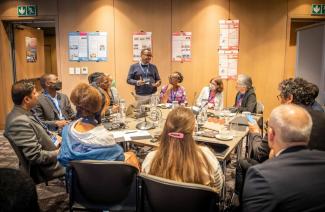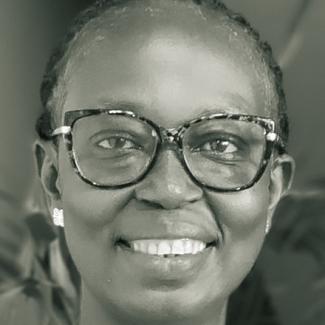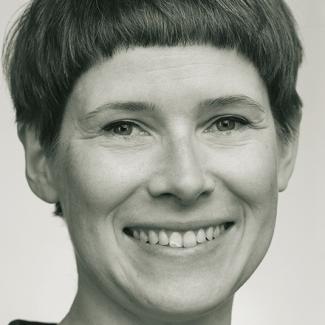SDG implementation
How to navigate complexity

We are halfway through the period for delivering on the SDGs by 2030. The clock is ticking faster and faster for the global community to act. At the same time, our societies and economies are confronted with an increasing number of multiple and mutually reinforcing crises. Only recently, the Secretary General of the United Nations (UN), António Guterres, issued a clear warning: “Our world is in peril”. But he insisted: it is not too late to save the SDGs.
With a mandate of the 75th General Assembly of the UN member states, Guterres has launched a process towards an additional pact for the future to boost the implementation of the SDGs. Within a year, the second SDG Summit and the Summit of the Future will take place. The SDG Summit will be held in September 2023. It serves as a mid-term review on the way to 2030 and focuses on tangible commitments by UN member states to achieve the SDGs after all. As proposed by Guterres in his report “Our Common Agenda”, the Future Summit in 2024 will additionally bring together UN member states and other stakeholders to establish a pact for the future.
The ways to implement the SDGs are context-dependent and as heterogeneous as economies and societies. Large-scale transformation of, for example, national energy or agricultural systems aims to achieve long-term sustainable effects, but it can cause significant losses for specific economic actors as well as for individuals. Such a structural change can therefore only succeed and be socially accepted if people know about alternative ways and can use them for themselves.
Multi-stakeholder platforms such as SDG advisory bodies can serve as an effective and innovative mechanism at the national level to apply an inclusive and mediating approach to conflicting interests in necessary change. Their rationale is to build consensus and foster social acceptance for transformations to achieve the 2030 Agenda. A multi-stakeholder advisory body has an explicit mandate to engage all sectors of society in the conversation about the path to a sustainable future. They do this by connecting knowledge, values and interests and promoting empowerment of diverse perspectives.
Advisory bodies as compasses
When integrating these advisory bodies into national governance architectures, societies can rely on a permanent advisory forum to tackle the decisions they will have to make in implementing the SDGs. These councils have a compass function: they ensure that all sectors of society are involved in finding solutions and developing national strategies, which reduces the risk of rejection of decisions.
However, such structures require preconditions. International comparison has shown that advisory bodies are particularly effective when their national government
- has committed to implementing the 2030 Agenda,
- has created a national sustainability strategy or similar,
- fosters sustained and institutionalised stakeholder engagement and
- can fund their engagement.
The Global Forum for National SDG Advisory Bodies is a network of such multi-stakeholder bodies that aims to accelerate the achievement of the SDGs by sharing experiences and visions of the future from different national perspectives. Emerging from the UN SDG Summit 2019, the Global Forum network collects and explores concrete ideas to strengthen societal discourse and build consensus on sustainable development.
Overcoming stalemates
In Germany, two ad hoc commissions set up by the federal government have shown how to deal with the complexity of conflicting interests in the conversion of the energy system and the agricultural sector. Both sectors are characterised by a high degree of conflicts of interest between farmers’ associations or energy companies with trade unions, nature-conservation associations, civil-society organisations (CSOs) and academic actors. The temporary commissions worked out compromises for the phase-out of coal and for the transformation of the German agricultural sector towards sustainable land use.
Since 2002, the German government has established a national sustainable development strategy, accompanied by the German Council for Sustainable Development (RNE) as an institutionalised multi-stakeholder advisory body. The RNE publishes statements on relevant topics related to sustainability and contributes to public awareness and social dialogue on sustainability. It was last appointed on 18 January 2023 for a period of three years. Fifteen members represent economic, social or environmental sustainability according to their professional and personal background. With a mandate to constructively accompany the transformation towards sustainability in all its facets, the RNE is independent in its choice of work. In recent years, for example, the council has helped in the stalemates between stakeholders and the government on the German supply chain law and on approaches to halt biodiversity loss while accelerating energy infrastructure.
Lower-income countries partly use different strategies to implement the SDGs. The Ghanaian government, for example, pursues a multi-actor and multi-agent approach. The implementation of the SDGs has been integrated into Ghana’s decentralised planning system so that political and financial resources can be made available for tracking the various SDG indicators. The National Development Planning Commission (NDPC) provides technical oversight to the decentralised authorities – the Metropolitan/Municipal District Assemblies (MMDAs) and the Ministries, Departments and Agencies (MDAs) – for the inclusion of the various indicators in development and sector plans. In this context, the NDPC serves as the secretariat of the Implementation Coordination Committee (ICC), which brings together various stakeholders from the government, the private sector, development partners and civil society. The ICC is composed of representatives from 10 key ministries, departments and agencies, such as the Office of the President, the SDG Philanthropy Platform, CSOs and the National African Peer Review Mechanism Governing Council (NAPRM-GC).
Decentralised structures affect SDG implementation
In addition, the Ghana Civil Society Organisations Platform on Sustainable Development Goals (CSOs Platform on SDGs) was established in 2015 to bring together CSOs working on the SDGs under one umbrella. The platform has contributed significantly to SDG processes at the national level and played a key role in mobilising citizen input to the two Voluntary National Reviews (VNRs) conducted in Ghana in 2019 and 2022.
As part of its coordinating role, the CSOs Platform on the SDGs has organised campaigns to highlight the situation of the vulnerable and to advocate with the government at all levels for action and policy reforms. For example, a media campaign on inequality was launched in 2020 and 2021 in cooperation with the CSO Oxfam. The platform and its partners have as well established a Covid-19 response fund to mobilise resources and support governments’ efforts. Alongside this, capacity building for monitoring and tracking government commitments related to the SDGs was carried out for member organisations in cooperation with the German Agency for International Cooperation (GIZ).
In general, it has become evident in Ghana that citizens’ knowledge of the SDGs and their indicators is limited. At the institutional and structural level, the challenges associated with Ghana’s decentralised local structures affect the implementation of the SDGs. It is therefore important that the Ghanaian government reviews the structures for implementing the SDGs and ensures that young people and private-sector actors can take part in the discussion on the SDGs.
Links
De Sas Kropiwnicki-Gruber, Z., and Alsaeedi, B., 2021: Pathways for national sustainable development advisory bodies.
https://www.nachhaltigkeitsrat.de/wp-content/uploads/2021/05/Study_Pathways_for_MSP-advisory_bodies_2021.pdf
Kirkbride, T., and Figueroa, D., 2021: Pieces of a puzzle: towards sustainable development advisory bodies.
https://www.nachhaltigkeitsrat.de/wp-content/uploads/2021/07/Global_Forum_Study_Pieces_of_a_puzzle_July_2021.pdf
Figueroa, D., and Harrison, T., 2022: Pieces of a puzzle: further steps on a journey.
https://www.nachhaltigkeitsrat.de/wp-content/uploads/2022/03/Global-Forum-Study_Pieces-of-a-Puzzle_March-2022.pdf
Beauty Emefa Narteh is the Executive Secretary of the Ghana Anti-Corruption Coalition and Co-Chair of the Ghana Civil Society Organisations Platform on SDGs.
bnarteh@gaccgh.org
Felix Meyerhoff is a Scientific Advisor at German Council for Sustainable Development.
felix.meyerhoff@nachhaltigkeitsrat.de
Hannah Janetschek is a Scientific Advisor at German Council for Sustainable Development.
hannah.janetschek@nachhaltigkeitsrat.de









